Related Research Articles

Gerald McBoing-Boing is an animated short film about a little boy who speaks through sound effects instead of spoken words. It was produced by United Productions of America (UPA) and given wide release by Columbia Pictures on November 2, 1950. It was adapted by Phil Eastman and Bill Scott from a story by Dr. Seuss, directed by Robert Cannon, and produced by John Hubley.

Henry Threadgill is an American composer, saxophonist and flautist. He came to prominence in the 1970s leading ensembles rooted in jazz but with unusual instrumentation and often incorporating other genres of music. He has performed and recorded with several ensembles: Air, Aggregation Orb, Make a Move, the seven-piece Henry Threadgill Sextett, the twenty-piece Society Situation Dance Band, Very Very Circus, X-75, and Zooid.
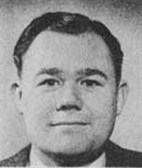
Gerald Theron Campion was an English actor. He is best remembered for his role as Billy Bunter in a 1950s television adaptation of books by Frank Richards.
Mark Harris was an American novelist, literary biographer, and educator, remembered for his baseball novels featuring Henry Wiggen, particularly Bang the Drum Slowly. Harris's obituary in The Denver Post calls him "one of that legion of under-the-radar writers who for decades consistently turned out excellent novels and went largely unsung as he did...Harris said of his books that 'they are about the one man against his society and trying to come to terms with his society, and trying to succeed within it without losing his own identity or integrity.' He might have said the same thing of himself."
Michael Moriarty is an American-Canadian actor. He received an Emmy Award and Golden Globe Award for his role as a Nazi SS officer in the 1978 miniseries Holocaust and a Tony Award in 1974 for his performance in the play Find Your Way Home. He played Executive Assistant District Attorney Benjamin Stone for the first four seasons (1990–1994) of the television show Law & Order. Moriarty is also known for his roles in films such as Bang the Drum Slowly, Who'll Stop the Rain, Q: The Winged Serpent, The Stuff, Pale Rider, Troll, Courage Under Fire, and Shiloh.
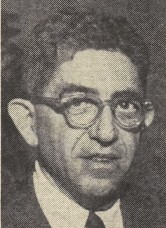
Ernest Nagel was an American philosopher of science. Along with Rudolf Carnap, Hans Reichenbach, and Carl Hempel, he is sometimes seen as one of the major figures of the logical positivist movement. His 1961 book The Structure of Science is considered a foundational work in the logic of scientific explanation.
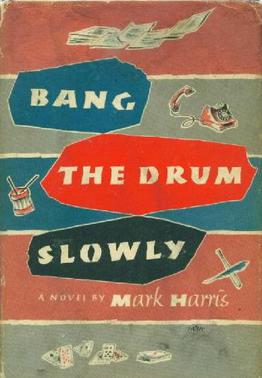
Bang the Drum Slowly is a novel by Mark Harris, first published in 1956 by Knopf. The novel is the second in a series of four novels written by Harris that chronicles the career of baseball player Henry W. Wiggen. Bang the Drum Slowly was a sequel to The Southpaw (1953), with A Ticket for a Seamstitch (1957) and It Looked Like For Ever (1979), completing the tetralogy of baseball novels by Harris.
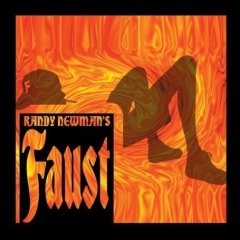
Randy Newman's Faust is the ninth studio album and a 1995 musical by American musician and songwriter Randy Newman, who based the work on the classic story of Faust, borrowing elements from the version by Goethe, as well as Milton's Paradise Lost, but updating the story to the modern day, and infusing it with humorous cynicism.
James George Hunter, known professionally as Jimmy Rowles, was an American jazz pianist, vocalist, and composer. As a bandleader and accompanist, he explored multiple styles including swing and cool jazz.
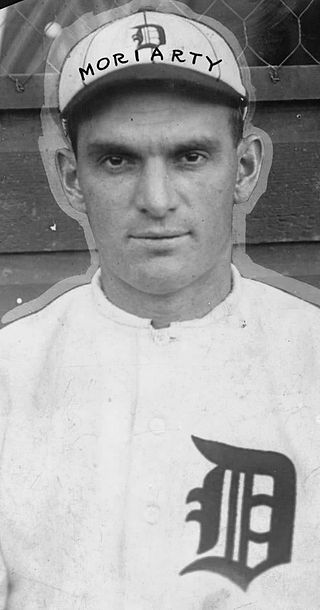
George Joseph Moriarty was an American third baseman, umpire and manager in Major League Baseball (MLB) from 1903 to 1940. He played for the Chicago Cubs, New York Highlanders, Detroit Tigers, and Chicago White Sox from 1903 to 1916.

Albert Salmi was an American actor of stage, film, and television. Best known for his work as a character actor, he appeared in over 150 film and television productions.

Anton Fig is a South African session drummer, perhaps best known as the drummer and second-in-command for Paul Shaffer and the World's Most Dangerous Band. David Letterman, for whom the band served as house band on his late-night talk shows, often referred to Fig as "Anton Zip" or "Buddy Rich Jr." Fig is also well known for his work with Kiss, Ace Frehley and Joe Bonamassa.
Mark Harris may refer to:
Dannis Peary is an American film critic and sports writer. He has written and edited many books on cinema and sports-related topics. Peary is most famous for his book Cult Movies (1980), which spawned two sequels, Cult Movies 2 (1983) and Cult Movies 3 (1988) and are all credited for providing more public interest in the cult movie phenomenon.

Bang the Drum Slowly is a 1973 American sports drama film directed by John D. Hancock, about a baseball player of limited intellect who has a terminal illness, and his brainier, more skilled teammate. It is a film adaptation of the 1956 baseball novel of the same name by American author Mark Harris. It was previously dramatized in 1956 on the U.S. Steel Hour with Paul Newman, Albert Salmi and George Peppard.
"Take This Hammer" is a prison, logging, and railroad work song, which has the same Roud number as another song, "Nine Pound Hammer", with which it shares verses. "Swannanoa Tunnel" and "Asheville Junction" are similar. Together, this group of songs are referred to as "hammer songs" or "roll songs". Numerous bluegrass bands and singers like Scott McGill and Mississippi John Hurt also recorded commercial versions of this song, nearly all of them containing verses about the legendary railroad worker, John Henry; and even when they do not, writes folklorist Kip Lornell, "one feels his strong and valorous presence in the song".
Oscar Brashear was an American jazz trumpeter and session musician from Chicago, Illinois.

"Bang the Drum Slowly" was an American television play that was broadcast live by CBS on September 26, 1956, as part of the television series United States Steel Hour. The play, about the friendship between two baseball players, starred Paul Newman. It was based on the 1956 novel Bang the Drum Slowly by Mark Harris.
Wiggen is a surname. Notable people with the surname include:
References
- ↑ The Southpaw, by Mark Harris, 1953; published by the Bobbs-Merrill Company
- ↑ Imagining Baseball: America's Pastime and Popular Culture, by David McGimpsey, published January 2000 by the University of Indiana Press
- 1 2 Henry Wiggen is still bringing the heat, by Ivan Maisel, at ESPN; published July 11, 2007; retrieved July 24, 2014
- ↑ HARRIS: It Looked Like For Ever, by Mark Harris, reviewed by Evan Charkes; in the Columbia Daily Spectator ; volume CIV; number 55; page 6; published December 3, 1979; retrieved July 25, 2014
- 1 2 Diamonds In The Rough – Mark Harris (An Interview with the writer of Bang the Drum Slowly), originally published in The Real Paper (Boston), October 27, 1979 (p. 5, 8 ,9); archived at GeraldPeary.com; retrieved July 25, 2014
- ↑ Paul Newman: A Life, by Shawn Levy; published September 25, 2010, by Aurum Press (via Google Books)
- ↑ Scene From 'Bang The Drum Slowly' (Caption:American actors (left to right) Paul Newman as Henry Wiggen, Albert Salmi (1928 - 1990) as Bruce Pierson, and Georgann Johnson as Holly, appear in a scene from the United States Steel Hour production of 'Bang the Drum Slowly' which aired September 26, 1956), at Getty Images; retrieved July 25, 2014